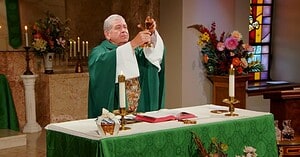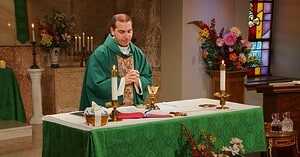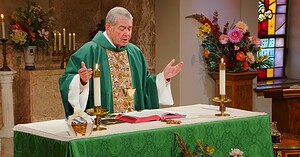Nineteenth Sunday in Ordinary Time
Homily Video
Nineteenth Sunday in Ordinary Time Homily Transcript
Waiting and preparation, you could say,
Are the themes for the readings this Sunday.
We have the image in our gospel of girding your loins.
And also the extended form
Of the gospel is keeping your lamps lit.
So just a couple of little historical tidbits here.
Girding your loins, like what does that mean?
You kind of hear this throughout the scriptures.
So back in the day in the ancient middle east
And ancient Israel,
People would wear robes generally, kind of like this.
They didn’t really have pants or jeans.
So they had robes.
So to gird your loins, and the robes were kind of longer,
They might drag on the ground.
They would basically hike up their robe
And then kind of wrap it around themselves.
So I was going to have Father Scott do this
To demonstrate hiking up your robe.
So they basically tie it like a diaper
Around there so their legs were free.
Father Scott, come on, show us your diaper.
No, I’m kidding.
So anyways, why would they do this?
They tie the robe like into a diaper.
Why? So they could run.
So they could move quickly
Because running in a robe is kind of cumbersome.
You might trip or whatever.
So there’s a sense of when Jesus says,
“Gird your loins and wait,” it seems like a paradox.
Well, like hurry up and wait.
But what our lord is basically saying is there’s an activity
In waiting or an active passiveness, if you will.
And then so just real quick also about the lamps.
So Israelites, of course, there wasn’t electricity back then.
They didn’t have flashlights.
So they had these oil lamps.
That’s how they produced light.
Now, an oil lamp was like kind of a shallow bowl
Filled with oil.
Generally, you know, olive oil, some vegetable oil.
And, you know, the oil had to be replaced
Because it would burn, of course.
But if you’re holding this oil lamp,
You had to be very focused on it, attentive.
Again, not like a flashlight
Where you just kind of wave it around,
And you’re like the phone on your iPhone or whatever.
So having your lamps lit meant you were very, in your waiting,
You were very attentive,
Very astute and focused on that thing.
So there’s this sense, you know, we’re all waiting in our lives.
You know, whether you’ve had your desires fulfilled,
Like say you’re married and you’ve got grandchildren
Or even you’re retired in your life,
You might think, well, my waiting is over.
But no, there’s always something we want more of.
And what Jesus is saying is, you know, don’t just sit back.
You know, he could have given the image of like,
Hey, wait your master’s return by like reclining on a couch
And, you know, cracking open a cold beverage or whatever.
But he says, gird your loins, have your lamps lit.
So when you’re waiting for something, be active in this.
So be hoping for it, almost tasting it.
So we see this beautifully on display in Abraham.
Abraham, again, is a focus of our first reading
And of our second reading in Hebrews.
Remember Abraham’s scene
When God calls Abraham to sacrifice Isaac.
Isaac is his son.
This is a very, you know, difficult scene, very traumatic.
This is Abraham’s only beloved son.
Isaac is going to carry on the inheritance,
Carry on the legacy.
This is what Abraham had been promised.
He gave birth to Isaac in their old age.
God shows up and says,
“Hey, I need you to sacrifice Isaac to me.”
Abraham is sitting there.
He’s sitting under a tree.
And when God shows up, he says, “Abraham, Abraham.”
And Abraham’s response is, “ready.”
It’s very interesting, ready.
So it wasn’t like Abraham was sitting there sleeping
And God had to kind of wake up, “yo, Abraham, wake up.”
And Abraham, wakes up and kind of wipes off
The Dunkin Donuts off his shirt.
No, it’s like Abraham is sitting there waiting for God.
And he says, “ready, I’m ready to go.”
“What do you want, lord?”
He says, “sacrifice your son.”
Abraham says, “okay, I’ll do it.”
“I’ll trust. I’ll have faith.”
So waiting is that readiness and also obedience, too.
Obedience is desiring to do the will of your superior,
In this case, God our heavenly father.
So what are we waiting for again in our lives?
We’re waiting to love Jesus more.
We’re waiting to be shown the path
That God is calling us to live.
And ultimately, we’re waiting for the ultimate union with God,
Which is our death
And God willing, our resurrection into eternity.
So as you’re waiting for your maker,
As you’re waiting for heaven, the end of your life,
Don’t just be sitting there passive.
Don’t just be surprised, but be active.
Be praying.
Be praying for others relating to God.
And maybe you’ll have the same response as Abraham did.
Ready, lord?
And we’ll go and do great things.
Amen.
Readings
Featured Text
Discover More
Sixth Sunday in Ordinary Time
February 15, 2026
Fifth Sunday in Ordinary Time
February 8, 2026
Fourth Sunday in Ordinary Time
February 1, 2026
Request Sunday Mass Guide
The Sunday Mass Guide sent to your home address
Spiritual nourishment and updates from the Sunday Mass community
Monthly reflections from Fr. Scott Donahue, our Principal Celebrant


